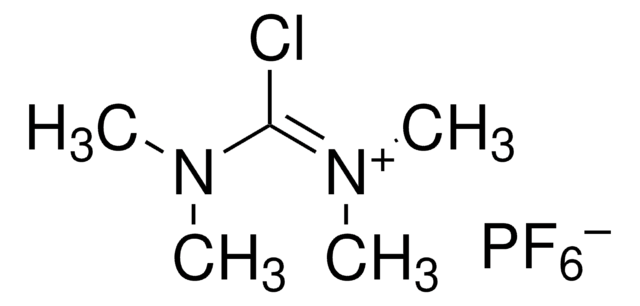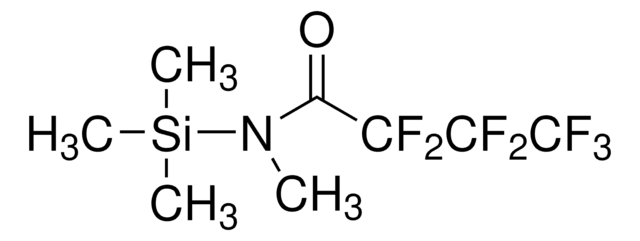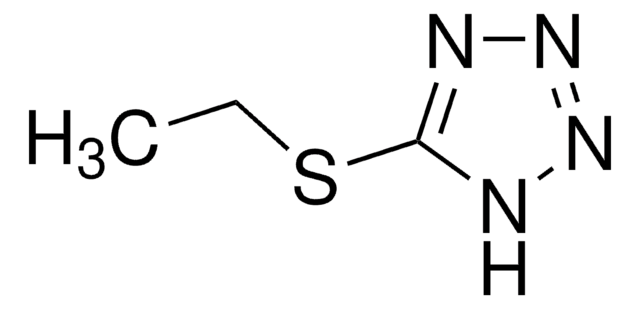8.05852
1-Methylimidazole
for synthesis
Synonym(s):
1-Methylimidazole, N-Methylimidazole
About This Item
Recommended Products
vapor pressure
0.4 hPa ( 20 °C)
Quality Level
Assay
≥99.0% (GC)
form
liquid
autoignition temp.
525 °C
potency
1144 mg/kg LD50, oral (Rat)
400-640 mg/kg LD50, skin (Rabbit)
expl. lim.
2.7-15.7 % (v/v)
pH
9.5-10.5 (20 °C, 50 g/L in H2O)
bp
198 °C/1013 hPa
mp
-2 °C
transition temp
flash point 92 °C
density
1.035 g/cm3 at 20 °C
storage temp.
2-30°C
InChI
1S/C4H6N2/c1-6-3-2-5-4-6/h2-4H,1H3
InChI key
MCTWTZJPVLRJOU-UHFFFAOYSA-N
Application
- Enhancement of noncorrosive electrolytes: Research discusses the role of 1-Methylimidazole in improving the properties of noncorrosive electrolytes for battery applications. This study explores how 1-Methylimidazole acts as a high donor number cosolvent, aiding in the release of free anions from commercially available magnesium salts, which could lead to innovations in battery technology (Xiao et al., 2024).
- Catalytic applications in organic synthesis: 1-Methylimidazole is utilized as a ligand in an air-stable ruthenium(II) complex, facilitating catalytic transfer hydrogenation of ketones from ethanol. This application demonstrates the catalytic versatility of 1-Methylimidazole in synthetic organic chemistry, providing a method for more efficient and sustainable chemical reactions (Beaufils et al., 2024).
- Functional materials for biomedical applications: Research involving 1-Methylimidazole focuses on developing sodium alginate- and cationic cellulose-functionalized polycaprolactone nanofibers. These materials are designed for specific in vitro and antibacterial applications, indicating the utility of 1-Methylimidazole in the creation of functional biomedical materials (Tolba et al., 2023).
Analysis Note
Density (d 20 °C/ 4 °C): 1.034 - 1.036
Identity (IR): passes test
Signal Word
Danger
Hazard Statements
Precautionary Statements
Hazard Classifications
Acute Tox. 3 Dermal - Acute Tox. 4 Oral - Skin Corr. 1B
Storage Class Code
6.1A - Combustible, acute toxic Cat. 1 and 2 / very toxic hazardous materials
WGK
WGK 2
Flash Point(F)
197.6 °F - closed cup
Flash Point(C)
92 °C - closed cup
Regulatory Listings
Regulatory Listings are mainly provided for chemical products. Only limited information can be provided here for non-chemical products. No entry means none of the components are listed. It is the user’s obligation to ensure the safe and legal use of the product.
FSL
Flammable liquids
Type 3 petroleums
Hazardous rank III
Water soluble liquid
Certificates of Analysis (COA)
Search for Certificates of Analysis (COA) by entering the products Lot/Batch Number. Lot and Batch Numbers can be found on a product’s label following the words ‘Lot’ or ‘Batch’.
Already Own This Product?
Find documentation for the products that you have recently purchased in the Document Library.
Customers Also Viewed
Our team of scientists has experience in all areas of research including Life Science, Material Science, Chemical Synthesis, Chromatography, Analytical and many others.
Contact Technical Service














